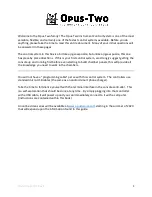
ES3016
Telemetry I2C interface with
BT transceiver for multiple
sensor and control
capabilities
INPUT
I2C bus with Bulk M12 for Hall effect, Thermal or level sensors
REPORTING & OUTPUTS
Measured parameter (5% variation)
Low battery
High/Excessive variation
Temperature
Data Interface
Raw data
Client mobile app
Automated Testing
Connection status
Battery status
ELECTRICAL SPECIFICATIONS
Battery Pack
Hybrid LTC 8.5Ah ~ 3.6 Vdc
RADIO SPECIFICATIONS
Receiver
Freq. : 2402.000MHz ~ 2480.000MHz
Modulation : GFSK
Transmitter
Freq. : 2402.000MHz ~ 2480.000MHz
Modulation : GFSK
Output: 4.73dBm
FEATURES
•
Auto
-
Pairing to any Otodata ready sensor
•
Android and IOS apps
•
Ready to install
ENVIRONMENTAL SPECIFICATIONS
Operating & storage
-
40C to +85C
-
40F to 185F
temp. range
Relative humidity range
0% to 100%
Enclosure rating
IP67
Warranty
1 year
CERTIFICATIONS
ISED RSS
-
247, Issue 2
IC Registration: 12649A
-
BEHT3AD
FCC Part 15 Subpart C
FCC ID: 2ADQFBEHT3AD
DIMENSIONS
Height
41mm[1.6in], Width 130mm[5.1in], Depth 66mm [2.6in]
ORDERING OPTIONS
ES3016
-
DH
-
Digital Hall sensor
ES3016
-
DT
-
Digital Temperature sensor
ES3016
-
DL
-
Digital Lidar sensor
This device complies with part 15 of the FCC Rules. Changes or modifications not expressly approved by the party responsible for compliance could void the user's authority to operate the equipment operation is
subject to the following two conditions: (1) This device may not cause harmful interference, and (2) this device must accept any interference received, including interference that may cause undesired operation.
This device is compliant with Industry Canada's RSS standards for licence
-
exempt radio apparatuses. Authorized use depends on the following two conditions: (1) the device must not create radio interference,
and (2) the device user must accept all radio interference, even if this interference could potentially impair its functioning. This equipment has been tested and found to comply with the limits for a Class B digital
device, pursuant to part 15 of the FCC Rules. These limits are designed to provide reasonable protection against harmful interference in a residential installation. This equipment generates, uses and can radiate
radio frequency energy and, if not installed and used in accordance with the instructions, may cause harmful interference to radio communications. However, there is no guarantee that interference will not occur
in a particular installation. If this equipment does cause harmful interference to radio or television reception, which can be determined by turning the equipment off and on, the user is encouraged to try to
correct the interference by one or more of the following measures:
--
Reorient or relocate the receiving antenna.
--
Increase the separation between the equipment and receiver.
--
Connect the equipment into an
outlet on a circuit different from that to which the receiver is connected.
--
Consult the dealer or an experienced radio/TV technician for help.























